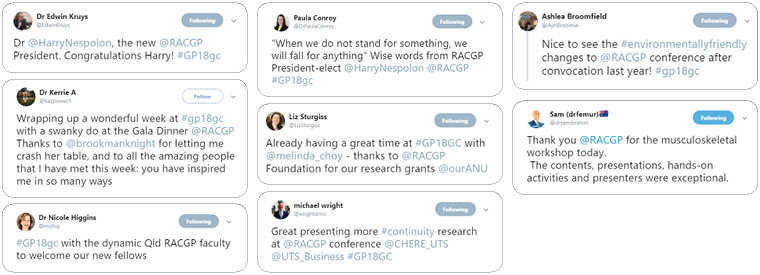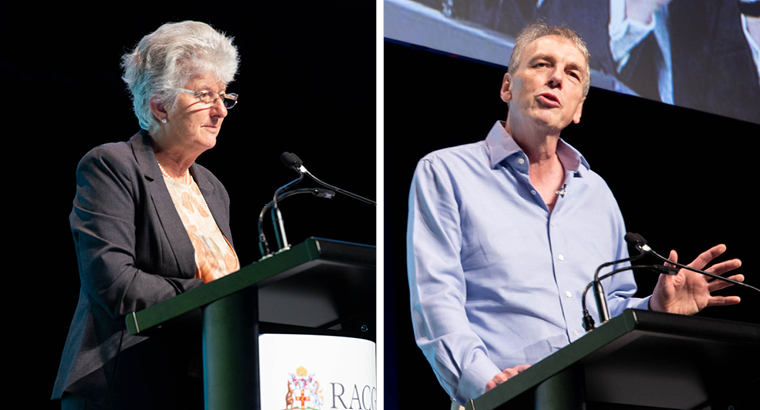News
GPs give thumbs up to annual conference
The sun has set on another RACGP annual conference.
 Many GPs were happy with the RACGP’s efforts to ‘go green’, including biodegradable lanyards and nametags.
Many GPs were happy with the RACGP’s efforts to ‘go green’, including biodegradable lanyards and nametags.
Australia’s GPs have offered praise for GP18, the RACGP’s annual conference held from 11–13 October on the Gold Coast.

The conference got underway on Wednesday 10 October, when delegates had the opportunity to participate in the pre-conference ALM day, which was designed to allow additional learning time that would not clash with conference presentations.
Wednesday also saw the college welcome new Fellows and award its outstanding members at the National Academic Fellowship and Awards Ceremony, with Dr Evan Ackermann named recipient of the 2018 Rose-Hunt Award, the RACGP’s highest accolade.
New RACGP President Dr Harry Nespolon officially opened the conference with his plenary speech on Thursday 11 October, during which he challenged GPs to take an active role in discussing their profession with key decision makers.
‘I challenge each one of you to make an appointment with your local federal member, no matter what the party,’ he said to GPs in the audience. ‘Go and see them, tell them what it is like to be a GP, about the care that you provide your patients and how difficult it has been without the ongoing support of all sides of politics.
‘Tell them that nice words are not enough.’
Federal Health Minister Greg Hunt also addressed Australia’s GPs on Thursday morning, announcing a $29.5 million injection into the RACGP’s Practice Experience Program (PEP).
‘We announced last year that the RACGP would regain control of training process, the general practice training program, and that is underway,’ Minister Hunt said.
‘I am delighted to announce that, as part of that, the Government will allocate [$29.5 million] to the [non- vocationally registered] GPs Fellowship training program – PEP.’
In addition, Shadow Minister for Health Catherine King and Leader of the Australian Greens Richard Di Natale spoke at the conference, with each discussing their visions for the future of primary healthcare.
Shadow Minister King said Labor wants to ensure timely, affordable access to general practice for all Australians, with alternate funding models for GPs being key.
‘We will not achieve the [RACGP’s] vision unless and until Commonwealth policy and funding rewards GPs for practising in a different way,’ she said. ‘That’s what the last Labor Government did, for example, through the introduction of the Coordinated Veterans’ Care Program.
‘And I can assure you it’s what a Shorten Labor Government would do, because general practice and your patients depend on it.’
Senator Di Natale promised to reintroduce the Australian National Preventive Health Agency.
‘Our vision is healthcare that’s universal and not just in name,’ he said. ‘We are seeing the erosion of healthcare and the emergence of a two-tiered healthcare system in Australia.
‘Our vision is prevention front and centre in healthcare policy. What we’ve got to do is invest in preventive care, [which is] very good value for money.’
The conference’s keynote speakers covered a range of areas.
Dr Angus Hervey and Tané Hunter from Future Crunch outlined their belief that artificial intelligence (AI) and gene editing are two of the most important emerging technologies that will directly change how GPs work.
‘Embrace the changes around you,’ Dr Hervey told GPs. ‘Get some young graduates to learn about AI or try it yourself. Start engaging with these technologies.
‘Try out genetic testing yourself so you can pass on the information to your patients.’
Other keynote speakers Professor Felicity Goodyear-Smith, from the University of Auckland in New Zealand, and Professor Peter Donnelly, of the UK’s Wellcome Trust Centre for Human Genetics, discussed the value of research and the genomics revolution, respectively.
 L–R: Keynote speakers Professor Felicity Goodyear-Smith, from the University of Auckland in New Zealand, and Professor Peter Donnelly, of the UK’s Wellcome Trust Centre for Human Genetics.
L–R: Keynote speakers Professor Felicity Goodyear-Smith, from the University of Auckland in New Zealand, and Professor Peter Donnelly, of the UK’s Wellcome Trust Centre for Human Genetics.
Professor Goodyear-Smith urged each GP to ‘be an active researcher’ and described making discoveries and putting them into practice to improve patient outcomes as ‘the golden ticket of general practice research’.
Professor Donnelly described genomics as ‘an area that is absolutely transforming our understanding of human biology’ and looked at how it will impact beyond traditional genetic areas, including rare diseases, cancer, infectious disease and common disease.
The annual general conference is also the time during which each RACGP Board officially begins its term, with the RACGP’s 61st Board commencing at GP18.
The Board features three new faces. Dr Kaye Atkinson replaced Dr Mark Miller as Censor-in-Chief; Dr Krystyna de Lange replaced Dr Mary Wyatt as Registrar Representative; and Dr Sean Stevens replaced Dr Tim Koh as Chair of RACGP Western Australia. In addition, Associate Professor Charlotte Hespe has been named Chair of RACGP Board, replacing Dr Tim Koh, and Associate Professor Ayman Shenouda has been named RACGP Vice President.
GP18 included all of the usual scientific programs, poster presentations and abstracts, and the exhibition hall was as busy as ever.
The conference also featured a number of social opportunities, including the Welcome Reception on Thursday evening, and the closing Gala Dinner on Saturday night, which was held under a ‘Havana Nights’ theme.
conference for general practice GP18
newsGP weekly poll
How often do patients ask you about weight-loss medications such as semaglutide or tirzepatide?